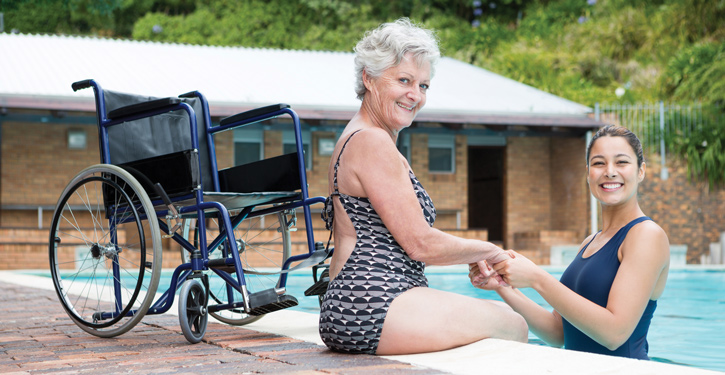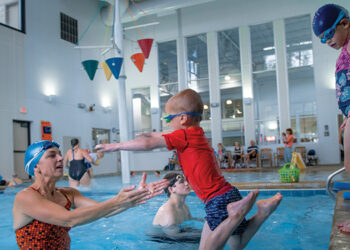Marley Cunningham, of Aqua Creek Products, shares how aquatics centers can uphold values of equality and inclusion.
In the realm of community recreation, inclusivity is not just a goal, it’s a cornerstone. Every member of the community should have the opportunity to enjoy the benefits of recreational facilities, regardless of their ability level. For community recreation professionals, ensuring accessibility is a legal obligation and a moral imperative.
At the heart of this commitment to inclusivity lies the accessibility of pools, arguably one of the most popular amenities in recreation facilities. For those in the industry of aquatics access such as pool lift providers, this responsibility takes center stage. Pool lifts are not merely devices — they are bridges to inclusion, granting individuals with disabilities the freedom to enjoy the therapeutic benefits and joy of swimming.
Empowering Every Community Member
When a community invests in accessible pool facilities, it sends a powerful message of inclusion. It tells individuals with disabilities they are valued members of the community, deserving of the same opportunities for recreation and wellness as everyone else.
Community recreation professionals play a pivotal role in this endeavor. By advocating for and implementing accessible pool areas, they break down barriers and create spaces where everyone can participate, regardless of physical abilities. This not only enriches the lives of individuals with disabilities, but also fosters a sense of unity and equality within the community.
Legal and Ethical Imperatives
Beyond the moral imperative, there are legal obligations that underline the importance of accessible pool facilities. The Americans with Disabilities Act (ADA) mandates public pools be made accessible to individuals with disabilities, including the installation of pool lifts in most cases.
Staying compliant with ADA regulations is not just a matter of avoiding legal issues, it’s a commitment to upholding the rights of all community members. Those in charge of pool facilities must ensure their spaces meet these standards, thereby creating an environment of dignity and respect for all.
Enhancing Safety and Efficiency
Access points not only promote inclusivity but also enhance safety and efficiency within recreational facilities. They provide a secure means for individuals with disabilities to enter and exit the pool, reducing the risk of accidents and injuries. Moreover, they streamline operational processes, require minimal staff assistance, and provide efficient means of entry and exits from the pool.
Conclusion
In the world of community recreation, every decision holds the potential to foster a more inclusive and vibrant community. For those in the field of aquatics access, the mission is clear: to champion accessibility and empower individuals with disabilities to enjoy the full spectrum of recreation.
By recognizing the importance of accessible pool facilities, community recreation professionals uphold not just legal obligations but the fundamental values of equality and inclusion. Through the installation of pool lifts, leaders build bridges that connect communities and pave the way for a future where everyone can dive into the joys of recreation, regardless of physical abilities.










